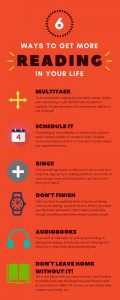![]()
I recently chatted with someone who claimed she wasn’t much of a reader because she rarely sat still long enough to read a book in any meaningful way. That is, until she discovered audiobooks. Audiobooks have helped her become more of a reader because she was able to do it during the times when she had to sit down anyway, like during her long commute. I discovered audiobooks in a similar way. While I’m an avid reader, I was looking to get more reading time into my day thinking “good grief, I hate spending all this time in the car when I could be reading…“. Then I had a huge forehead-slapping moment when I remembered that audiobooks exactly that: a way to safely read in the car.
Once I discovered one of the benefits of audiobooks (and there are many), I didn’t necessarily jump right onto the bandwagon, though. As I mentioned in last week’s post, everyone has their own preference when it comes to audiobooks, and much like a fairy-tale princess, you may have to kiss some frogs before you find the style(s) that suit you best. Some people for example can’t read fiction in the car because they find it too engrossing. They get so involved in the story that listening to a book in the car is no longer a way to read safely; it’s distracting instead. It’s just not the audiobook style for them.

I kissed several frogs when I started to listen audiobooks and still do, even though I’ve been listening to them for years. Sometimes a narrator of a nonfiction work sounds pretentious and didactic, rather than engaging. Sometimes the reader presents a character that sounds completely differently in your head and you just can’t listen to the portrayal without getting aggravated (been there, so many times). Sometimes the story is something that’s right up your alley, but it’s better left in print form. I come across this a lot in my reading. Sometimes I just need to see the word on the page to make it come alive in my head. Nothing against the narrator, just a personal preference.
This week, I thought I’d offer a sort of if/then for audiobooks, not necessarily based on their plot (you’ll find summaries in the catalog links), but based more on what listening style it could attract. If you’re thinking about trying audiobooks or just looking for your next listen, maybe something here will float your boat:
 If you want to be engrossed but not distracted try: The Devil and Sherlock Holmes: Tales of Murder, Madness and Obsession by David Grann
If you want to be engrossed but not distracted try: The Devil and Sherlock Holmes: Tales of Murder, Madness and Obsession by David Grann
The narrator for this book did a great job expressing the tone of the text, which is about true stories that explore some form of obsession, without being overly dramatic or didactic. You won’t get someone changing their voice to mimic characters here, just a solid narration from someone who knows who to tell a gripping story. The fact that this is a series of tales, rather than one long story helps temper the tenseness of the subject matter so you’re less likely to drift too far into your imagination.
 If you’re looking to laugh with non-fiction try: Let’s Pretend this Never Happened by Jenny Lawson
If you’re looking to laugh with non-fiction try: Let’s Pretend this Never Happened by Jenny Lawson
Lawson’s books are poignant, endearing and completely hysterical. This memoir about her life growing up in Texas and coming of age with her own personal issues is guaranteed chuckles and guffaws, partly because the author reads the book herself, giving the reader a sense that they’re out having drinks with that friend who always knows how to crack you up. Plus, the audiobook has a gag reel. Need I say more?
 If you’re looking to laugh with fiction try: Fool by Christopher Moore
If you’re looking to laugh with fiction try: Fool by Christopher Moore
Moore’s book about the fool in the court of King Lear is the book that made me say “this whole audiobook thing is going to work out just fine.” The narrator in this book does character voices spot-on with authentic-sounding accents, great comedic timing and differentiation that made me wonder a few times if there was more than one person reading the book. He did such a good job that I couldn’t imagine these characters sounding any other way.
 If you’re looking for a cast of characters try: The Gurnsey Literary and Potato-Peel Pie Society by Mary Ann Shaffer
If you’re looking for a cast of characters try: The Gurnsey Literary and Potato-Peel Pie Society by Mary Ann Shaffer
Not only are the characters in this WWII historical novel well-drawn, they are very well-read by a cast, rather than relying on one narrator to do all the voices. Having multiple people read this story works very well for the epistolary style of the novel and helps keep a pretty large cast of characters in straight when you’re not seeing names on the page.
Bonus: If you’re looking for an epic cast of characters, try Lincoln in the Bardo by George Saunders which is read by 166 people, including Lin Manuel Miranda, Julianne Moore, David Sedaris, Ben Stiller, Don Cheadle and Nick Offerman.
 If you’re looking for something classy try: The Iliad by Homer
If you’re looking for something classy try: The Iliad by Homer
Dan Stevens (Downton Abbey, Beauty and the Beast) narrates this classic, epic poem with style. His narration is subtle without being boring and he tackles the immense number of Greek names expertly. Since the Homeric tradition is an oral one, you get the sense that you’re listing to this book the way it was always meant to be done.
Bonus: If you’re a fan of celebrity narration, there’s plenty to be found out there, but few actors read books as well as Stephen Fry. Arabella mentioned his narration of the Sherlock Holmes canon (which I can’t wait to listen to myself), but may I also suggest his reading of Douglas Adams’s classic sci-fi caper, The Hitchiker’s Guide to the Galaxy for a true reading treat.
I hope this post has given you some options if you’re just dipping your toe into the audiobook waters, or if you a longtime listener but are looking for something new. Till next week, dear readers, remember that good books (including audiobooks) are in the eye of the beholder, so don’t be afraid to experiment!




 For those of you looking for a more reality-based primer prior to watching (or completely ignoring) this show, here’s some brief info.
For those of you looking for a more reality-based primer prior to watching (or completely ignoring) this show, here’s some brief info.  was also a sociologist, journalist and historian. His first book was, surprisingly, given his reputation for fantastical fiction in later life, a biology textbook.
was also a sociologist, journalist and historian. His first book was, surprisingly, given his reputation for fantastical fiction in later life, a biology textbook.  November of 1888. It is also possible that the killer committed murders prior to and after those dates, depending upon how certain crimes of that time are viewed. Jack the Ripper has captured the imagination of many true-crime aficionados who still
November of 1888. It is also possible that the killer committed murders prior to and after those dates, depending upon how certain crimes of that time are viewed. Jack the Ripper has captured the imagination of many true-crime aficionados who still 













 Pedro Paramo
Pedro Paramo










 Inspector Rebus series by Ian Rankin
Inspector Rebus series by Ian Rankin Hamish Macbeth series by M. C. Beaton
Hamish Macbeth series by M. C. Beaton Isabel Dalhousie series by Alexander McCall Smith
Isabel Dalhousie series by Alexander McCall Smith Kilts and Quilts series by Patience Griffin
Kilts and Quilts series by Patience Griffin